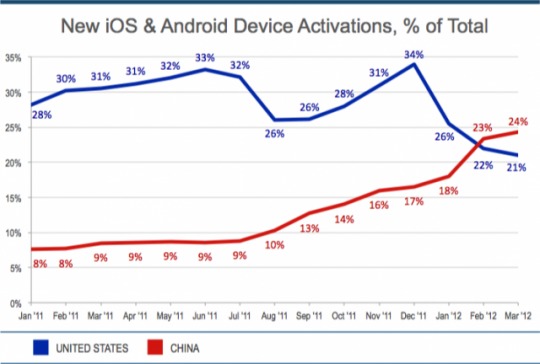
Holy cow. According to a new report from analytics firm Flurry, the number of newly activated Android users in China has surpassed that of the United States to become the world’s fastest-growing body of smartphone users. The stat holds true for iOS as well, making China the #1 country for total number of smartphone users on the planet. That’s hardly surprising – they’ve got the largest number of people after all, nearing 1.5 billion as of 2010 – but the rapid adoption rate in the country just a few years after the emergence of the current mobile market is astonishing.
The difference is small at the moment. Flurry said that 23 percent of the combined new devices for Android and iOS come from China, compared to 22 percent from the United States. But that percentage is sure to grow, and grow quickly. At the moment the US still has twice as many smartphones as China (the new figures are for activations, not active users). The rapid adoption can be accounted for by rising prosperity among China’s middle and upper class.

The interesting thing about it is that Google doesn’t officially offer its services for Android in China. Pretty much all of the Android phones and tablets sold at retail are using the open-source operating system independently, doing without the popular Google apps and integration and the ease of use of the Google Play Store. Also note that Google doesn’t count non-certified devices among their official activations – that 850,000 figure from Mobile World Congress likely doesn’t include anyone outside of Hong Kong.
[via TechCrunch]










Why am I not suprised? But those numbers went down for US Anroids were cut in half in a matter of months. I’d like to know what’s behind that.
Well, that’s I think because Gmail itself appears to be accessible via the Google website. The issue is mainly with accessing Gmail through the app on an Android phone. This requires accessing the email service via Google’s own special servers. It is these which are apparently being blocked. Now Android Market also uses the Google servers. Although the app was blocked totally earlier today, it’s reported to be running now, although with greatly reduced performance.